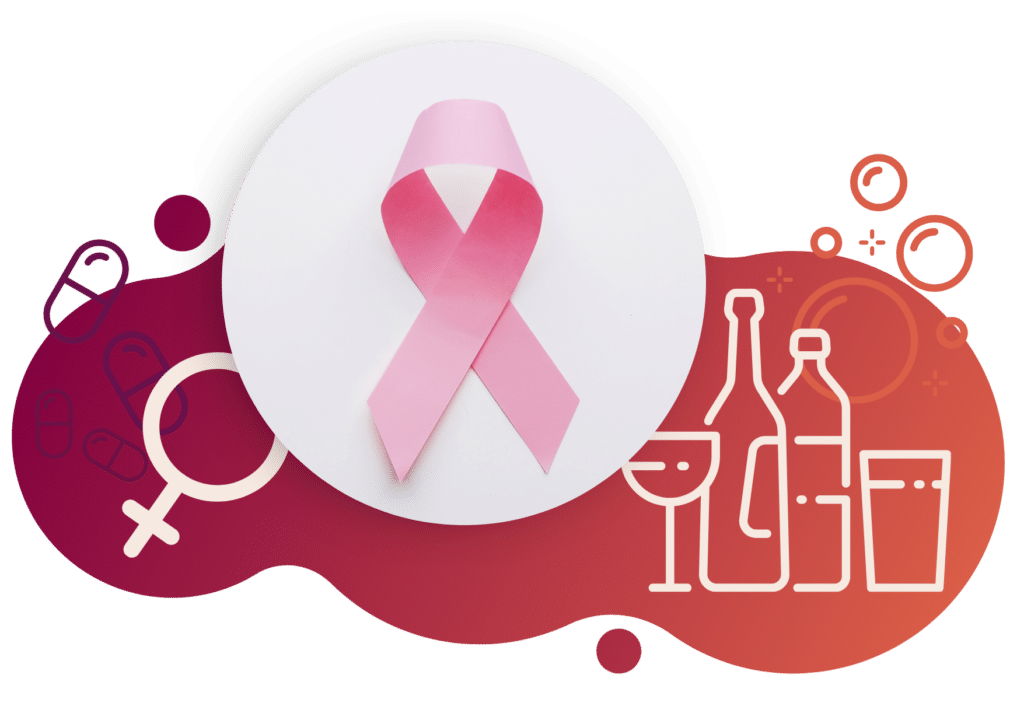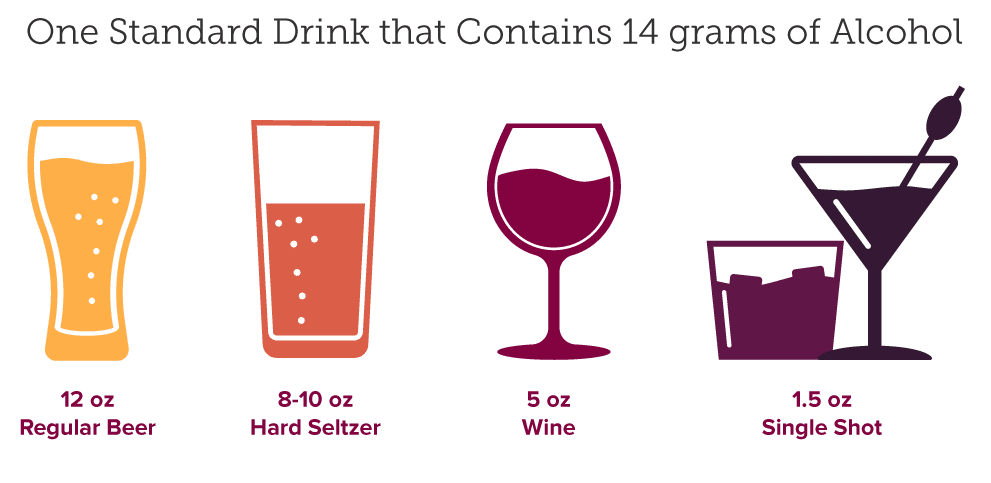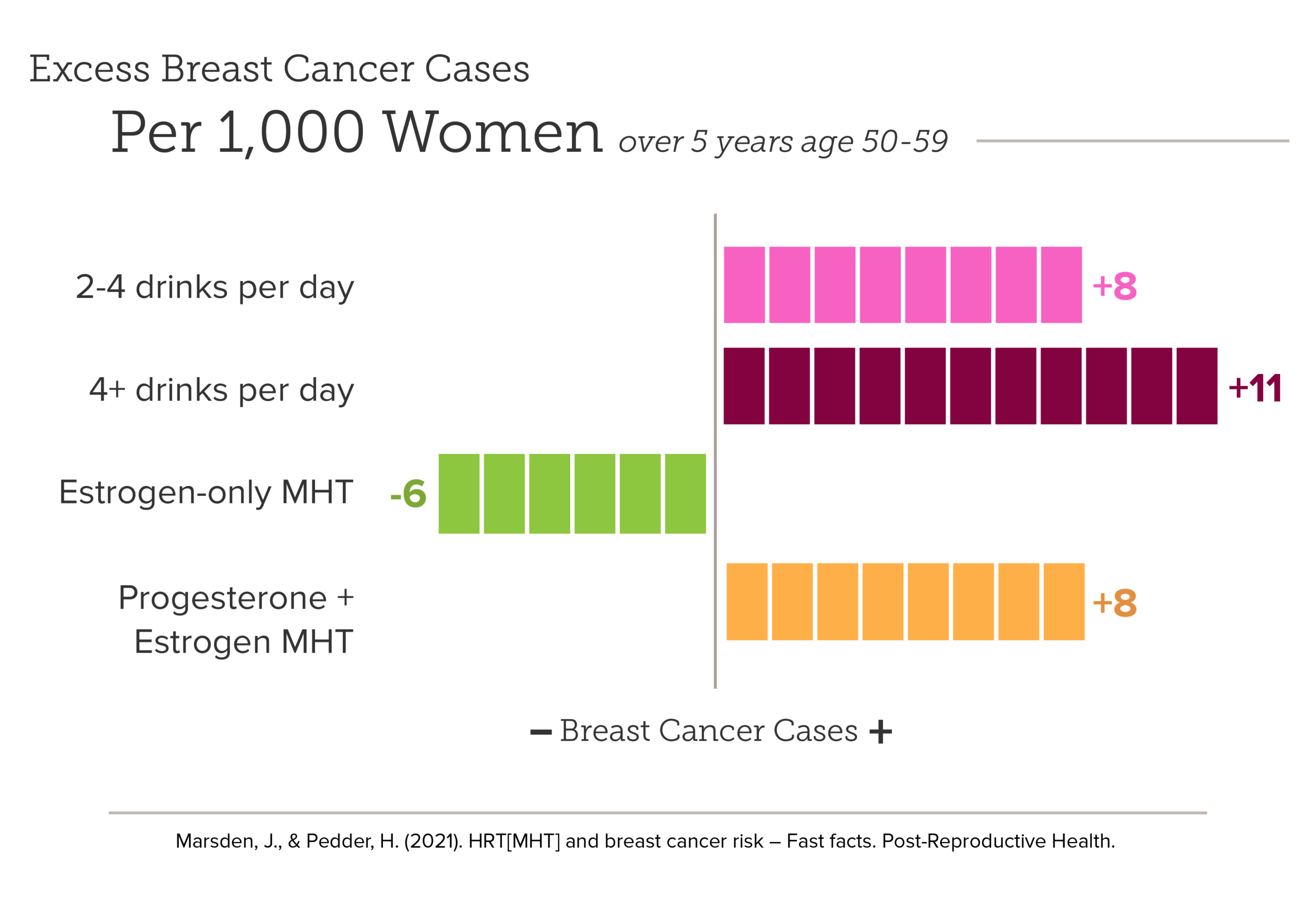
Staying on top of health-related knowledge can be overwhelming. With constant advancements in science, it’s not always easy to keep track of new findings. Yet, it’s important to know which discoveries are beneficial to our health and which ones identify potential risks. In a previous post, we discussed several risk factors associated with breast cancer, such as age, genetics, and personal and family history.
We also identified a risk factor that may have been surprising to you – alcohol consumption.
If you are surprised that drinking alcohol may be linked to breast cancer, you aren’t alone. In Stephanie Mencimer’s article Did Drinking Give Me Breast Cancer?, she was shocked to discover that her breast cancer may have been linked to the alcohol she consumed over her lifetime.1 She believes her ignorance was likely caused by the alcohol industry’s efforts to hide alcohol’s connection to cancer risk.
Meanwhile, Menopausal Hormone Therapy (MHT), formerly Hormone Replacement Therapy (HRT), has long been considered a potential breast cancer risk factor, although many studies suggest that the risk is relatively small, and in many situations, the benefits outweigh the risks.
In this post, we dive deeper into the risks associated with both alcohol consumption and MHT.
The link between alcohol and cancer
According to the National Toxicology Program of the US Department of Health and Human Services, alcoholic beverages are classified as a known human carcinogen.2 Alcohol is classified this way because your body metabolizes it into acetaldehyde, a toxic compound that can damage DNA and lead to cancer.3 Because of this, there is strong scientific evidence linking alcohol consumption to various cancers.4,5 Additionally, studies have shown the more alcohol that is consumed, the greater the risk of developing cancer.6-10
Alcohol and breast cancer risk
The World Cancer Research Fund and the American Institute for Cancer Research concluded that, based on the existing literature, alcohol consumption is a “probable cause” for premenopausal breast cancer and a “convincing cause” for postmenopausal breast cancer.
Their analysis showed that for a 10-gram increase in alcohol consumed per day on average, risk increased 5% among premenopausal women and 9% among postmenopausal women.12 A standard drink contains approximately 14 grams of alcohol.13 This means, a little can go a long way.
Given these findings, experts recommend that women who are concerned about breast cancer reduce their alcohol intake or avoid it altogether.14

MHT and breast cancer risk
According to the North American Menopause Society, a leading group of healthcare providers who specialize in health issues for women at perimenopause and beyond, MHT remains the most effective treatment for the symptoms of menopause.15 Still, MHT has long been scrutinized for its possible role in increasing breast cancer risk. While MHT does carry some risk, research shows that the degree of this risk is generally lower than previously believed.17,18
Women using estrogen-only MHT for less than five years have little to no increase in breast cancer risk.
In fact, a study that combined data from one large Women’s Health Initiative study and nine smaller studies determined women with average breast cancer risk who took estrogen without progesterone, after menopause, had lower rates of breast cancer than those who did not take any hormone replacement at all.19 However, combined MHT (estrogen and progesterone) has been shown to increase breast cancer risk, particularly for women who use it for more than five years.20
Ultimately, the risk factors are lowest for women who begin MHT before the age of 60, less than 10 years after the start of menopause and who do not have a personal family history of conditions like cancer or heart disease. Also, the risks diminish after stopping MHT, and many studies argue that for women in need of symptom relief, the benefits of short-term MHT likely outweigh the risks.
MiraKind is conducting a research study to understand who is at increased breast cancer risk from using MHT. If you’d like updates on the MHT study, subscribe to our monthly newsletter.
Alcohol vs. MHT and breast cancer risk
We’ve covered a lot of information. The following chart breaks down the risk factors into numbers and compares them.21

The benefits deceptions of alcohol
The alcohol industry often highlights the potential health benefits of moderate drinking, such as improved heart health or stress relief. However, studies show that any suggested benefits of alcohol are outweighed by the increased cancer risk.22
Even the commonly cited, possible health benefits associated with red wine’s polyphenol and resveratrol (which can be found in other foods, by the way) are not enough to mitigate the harms caused by alcohol.3 In spite of the alcohol industry’s claims, a large-scale study concluded that the optimal number of drinks per day to minimize health risks is actually zero.23
The benefits of MHT
While MHT may carry some risk, it also offers significant benefits, particularly for postmenopausal women. It helps alleviate symptoms like hot flashes, night sweats, mood swings, and vaginal dryness, improving the overall quality of life. MHT can also help prevent bone loss (osteoporosis) and may reduce the risk of colorectal cancer.24 MHT also appears to decrease the risk of Alzheimer’s Disease.
The bottom line: do your best
Life is full of decisions and science is constantly evolving, so all we can do is our own personal best to make the right choices for our health. Keeping up with health findings is important so you can consider making changes that might impact your health. Overall, staying healthy includes many different approaches, with balance being an important one.
References
- https://www.motherjones.com/politics/2018/04/did-drinking-give-me-breast-cancer/
- https://ntp.niehs.nih.gov/sites/default/files/ntp/roc/content/profiles/alcoholicbeverageconsumption.pdf
- https://www.cancer.gov/about-cancer/causes-prevention/risk/alcohol/alcohol-fact-sheet#r3
- https://www.ncbi.nlm.nih.gov/books/NBK326568
- https://publications.iarc.fr/Book-And-Report-Series/Iarc-Monographs-On-The-Identification-Of-Carcinogenic-Hazards-To-Humans/Personal-Habits-And-Indoor-Combustions-2012
- https://www.ncbi.nlm.nih.gov/pmc/articles/PMC5912140
- https://www.ncbi.nlm.nih.gov/pmc/articles/PMC4453639
- https://www.researchgate.net/publication/281126322_Light_to_moderate_intake_of_alcohol_drinking_patterns_and_risk_of_cancer_Results_from_two_prospective_US_cohort_studies
- https://www.ncbi.nlm.nih.gov/pmc/articles/PMC3292347
- https://www.ncbi.nlm.nih.gov/pmc/articles/PMC5860148
- https://www.cancer.org/cancer/risk-prevention/diet-physical-activity/alcohol-use-and-cancer.html
- https://www.ncbi.nlm.nih.gov/pmc/articles/PMC7295577
- https://www.niaaa.nih.gov/alcohols-effects-health/overview-alcohol-consumption/what-standard-drink
- https://acsjournals.onlinelibrary.wiley.com/doi/full/10.3322/caac.21591
- https://menopause.org/wp-content/uploads/professional/nams-2022-hormone-therapy-position-statement.pdf
- https://www.ncbi.nlm.nih.gov/pmc/articles/PMC6780820
- https://jamanetwork.com/journals/jama/fullarticle/2768806
- https://www.bmj.com/content/371/bmj.m3873
- https://www.facingourrisk.org/XRAY/estrogen-without-progesterone-as-HRT-may-lower-breast-cancer#:~:text=Researchers%20found%20that%3A,breast%20cancer%20risk%20by%2037%25
- https://www.thelancet.com/journals/lancet/article/PIIS0140-6736(19)31709-X/fulltext
- https://research-information.bris.ac.uk/files/267031112/Tools_for_Clinicians_HRT_and_breast_cancer_.pdf
- https://jamanetwork.com/journals/jamanetworkopen/fullarticle/2822215#google_vignette
- https://www.thelancet.com/article/S0140-6736(18)31310-2/fulltext
- https://menopause.org/wp-content/uploads/professional/nams-2022-hormone-therapy-position-statement.pdf




Leave a Reply